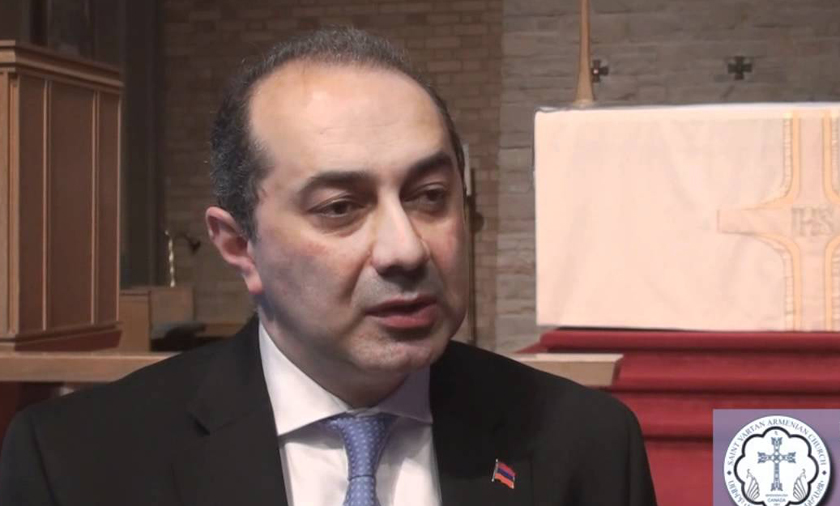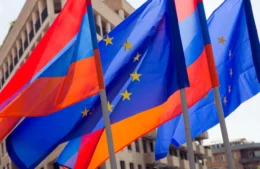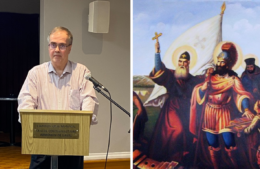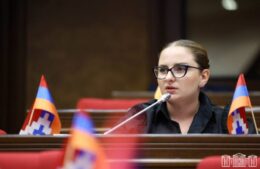‘A People United Cannot Be Conquered’: Armenian Ambassador to Canada Armen Yeganian
- (0)

An interview with Armenian Ambassador to Canada Armen Yeganian
By Vahakn Karakachian
On the eve of the Genocide Prevention March held on May 8, 2016 in Montreal Horizon Weekly’s Editor in Chief Vahakn Karakachian met Ambassador Extraordinary and Plenipotentiary of the Republic of Armenia to Canada Armen Yeganian for an interview.
H. Ambassador Yeganian, this year marks the fifth anniversary of your ambassadorship. How would you survey your service during this five-year period?
AY: Thank you, Mr. Karakachian, for your invitation. It has become a tradition to be interviewed by Horizon Weekly. First and foremost, I should say that these last five years passed by like an instant. But it’s worth mentioning that in our country we’ve been building up all aspectsof political, diplomatic, trade and cultural affairs that were being undertaken by previous ambassadors and proxies before I arrived. Each one of them contributed to building and fostering Armenian-Canadian relations.
Firstly, I’d like to recall the negative atmosphere in the Canadian parliament in 2011 when four proclamations were introduced about the so-called Khojaly “genocide” supposedly committed by the Armenians. The situation was troubling and we immediately mobilized. With the support of Armenian National Committee of Canada we met with Canadian senators and deputies and presented them with the facts. Thanks to our efforts the problem was solved, and since 2011 a similar proclamation was never introduced again in the Canadian parliament.
In subsequent years we began working on strengthening the political and diplomatic relations between our countries. The first positive event that occurred was when, for the first time in the history of Armenian-Canadian relations, a delegation led by parliamentary secretary Deepak Obhrai visited Armenia to take part in the president’s inauguration ceremony. That visit marked the first time that a prominent delegation from Canada participated in such a major event on Armenian soil. After that several Canadian parliamentary and governmental delegations visited Armenia, including a visit by Minister Jason Kenney. Parliamentarians Jim Karygiannis and Stéphane Dion visited Artsakh.
In 2015 Minister of Energy and Natural Resources Yervand Zakharyan, Minister of Diaspora Hranush Hakobyan and National Assembly President Galust Sahakyan visited Canada. Two ministerial delegations from Canada went to Armenia—one led by Chris Alexander, who participated in theArmenian Genocide Centennialcommemoration ceremony. Christian Paradis was a delegate to the Ministerial Conference of the Francophonie, which was attended by 80 diplomats from around the world and was one of the most significant events of the last 24 years. Thanks to these visits Canada and Armenia became even closer.
I also want to point out quite an interesting initiative in trade relations that was started between our countries. The first trade mission to Armenia—the first of its kind–that included about 22 people took place last year, which was followed up by a second trade mission this year. These visits are essential to help strengthen our relations in the fields of technology and agriculture. I also want to mention the police delegation from Ottawa that went to Armenia as part of a recent initiative to address educational reforms in law enforcement that are needed. These undertakings were impressive and they all learned a lot in Armenia. This is just the beginning of a long-lasting collaboration between our two countries.
I want to thank all our Canadian colleagues, the Armenian National Committee and the Canadian-Armenian community for supporting this collective initiative to strengthen relations between Canada and Armenia.
H. Economic cooperation is also important in the bilateral relations between Canada and Armenia. Canada is one of the top countries investing in Armenia, particularly in the mining industry. What is the status of those relations today?
AY: We think that there’s a mutual readiness to strengthen those relations because they have always existed. We, of course, have significantly good relations, especially in the mining and high technology sectors as you pointed out. Years ago we helped the Maple Leaves Medical Clinic start up its operations in Armenia. We helped RE/MAX open a real estate agency branch in Armenia as well.
Thanks to Canada’s investments in 2012-2013, we now have several companies like Lydian International, Dundee Precious Meals and Centerra Gold. We made an agreement with Centerra Gold, which is a new company, in 2015 during Minister Zakharyan’s visit. Lydian International’s Toronto office started investing $480 million in early April. I’m always in touch with their management to find out whether they need help with anything or to understand what they’re doing in Armenia. This collaboration is very important because Armenia can become a serious contender in the mining industry. But what’s important for us is that companies from the West, especially from Canada, have a presence in the Armenian market because they are very environmentally responsible, and that’s important for the health of the population. That’s why we’re concentrating on strengthening those relationships, of course.
H: Ambassador Yeganian, you’re expected to simultaneously turn your attention to three points or fronts– fostering bilateral relations between Armenia and Canada, confronting the Turkish propaganda machine and dealing with Azerbaijan. The Canadian ambassadors have always been on the barricade to face these fronts. How will you contain the Turkish-Azerbaijani propaganda when you set the ball rolling?
AY: Very good question. With difficulty and ease. Some of my colleagues from other countries, like from Latin America, really have only one portfolio on how to strengthen relations between countries. In our case, beside that one important direction, we have two more directions. One is the Turkish factor. Even in this country, which has recognized the Armenian Genocide on all levels, Turkey’s propaganda continues to spread. Their efforts started years ago and they are a result of the Genocide’s recognition.
In 2013 deliberations took place for two months in the Canadian parliament about how to repair the damaged relations with Turkey that came about after Canada recognized the Genocide. At the time I was in constant contact with the Foreign Ministry stating that we, naturally, are not opposed to Canada having good relations with all countries—in other words Turkey—but maintaining good relations or repairing damaged relations cannot come at the expense of Armenia and the Armenian people, and especially the recognition of the Armenian Genocide.
Turkey never sleeps–it continues its anti-Armenian campaign and we, naturally, are exerting all our efforts to counteractTurkey’s undertakings.
Our undertakings are easy because we’re doing the right thing, and we’re facing this problem the proper way. I always think about how difficult it would be to undertake the Turkish Foreign Ministry’s mission had I been a Turkish ambassador given that they’re distorting the truth (especially when educated Turkish diplomats know about their past quite well). That’s why our work is easy from that perspective. The same applies to the issue between Azerbaijan and Nagorno-Karabakh, which is a separate issue; nevertheless, it’s interwoven with the Genocide issue. That’s because the Nagorno-Karabakh problem is directly related to the Armenian Genocide and Pan-Turanism, which the Turks have been using against the Armenians for centuries.
Today our people live on only 10 percent of our historic Armenian lands. However, the Nagorno-Karabakh issue revived our nation by renewing our strength. We felt how powerful and bold we are. We regained our confidence in ourselves and felt that we are a worthy nation capable of defending our rights. And not only did we liberate Artsakh but also the territories surrounding it.
We’re forced to constantly struggle against the propaganda machine that, for example, talks about the so-called Khojaly “genocide” and the four-day war in Nagorno-Karabakh. Lately all we’re doing is focusing on that issue and we’ve had tens of meetings with political leaders to spread awareness about the truth. That’s important because there are 200 deputies who don’t know about the issue.
H: At the beginning of April Armenian soldiers faced a new Battle of Avarayr, a new Battle of Sardarabad. Today Artsakh has the status of a “Garrison state.”What do you make of Baku’s military offensive?
AY: We all witnessed what happened in the beginning of April. Baku tried to send its vile menace to the battlefield, and the effort was a complete failure. Azerbaijan decided to defy the demands for peace from the international community. The Aliyev regime unleashed a military offensive and as a result there were scores of dead and wounded. Baku at the same time violated international humanitarian and human rights in defiance of their own obligations.
Despite the cessation of hostilities between Azerbaijan, Nagorno-Karabakh and Armenia in 1994 and the OSCE Minsk Group’s periodic calls for the unconditional fulfillment of the ceasefire agreement letters sent by the OSCE and UN, Baku attempts to cast doubt on the validity of the agreement. These efforts were thwarted thanks to the quick response of the OSCE Minsk Group member states, which urged the complete observance of the ceasefire agreement.
Azerbaijan continues to violate the ceasefire agreement along the line of contact with heavy and technologically advanced military equipment, while strengthening its militant rhetoric and provocative propaganda to the world. Azerbaijan claims that Armenia was the instigator of everything for whichAzerbaijan was responsible in order to launch a new military offensive, which would have unpredictable consequences for the entire region.
It’s imperative that the events of early April are prevented in the future and a guarantee is in place to suppress a dangerous military solution to the problem. The confidence-building measures proposed by the co-chairs, the call for an investigative body to probe the ceasefire violations and the OSCE’s escalated efforts will all certainly contribute to that purpose.
H: Given the historic times we’re living in, what message do you have for Canadian-Armenians?
AY: The Armenian community of Canada has always expressed willingness to use its power to support Armenia in the problems the homeland faces. I want to express my admiration to all my compatriots for their patriotism and vigilance. You once again showed that a people united as one fist cannot be conquered. During the last month the Canadian-Armenian community revealed its strong commitment to Armenia and Artsakh. Its assistance came in the form of large money transfers, hundreds of boxes of clothes and military-related absolute necessities. That support and attention to the homeland’s needs is proof that they are ready for a call to action as they showed in April until now. Our hundreds of compatriots from different Canadian cities, from Vancouver to Newfoundland, contacted us to find out how they could reach Artsakh and then the front line. Once again, the collective strength of the Armenians cannot be conquered.
The lawlessness of Azerbaijan’s leadership still continues today. The current situation compels each and every one of us to do whatever we can, wherever we are. I urge you all to rest. Follow the information being announced by the Embassy every day and contact us with any questions.
This isn’t the first time that the Armenians have shown their solidarity and diligence. They’ve done so time and time again for centuries and will continue for centuries more.
Translated by Christian Garbis


















